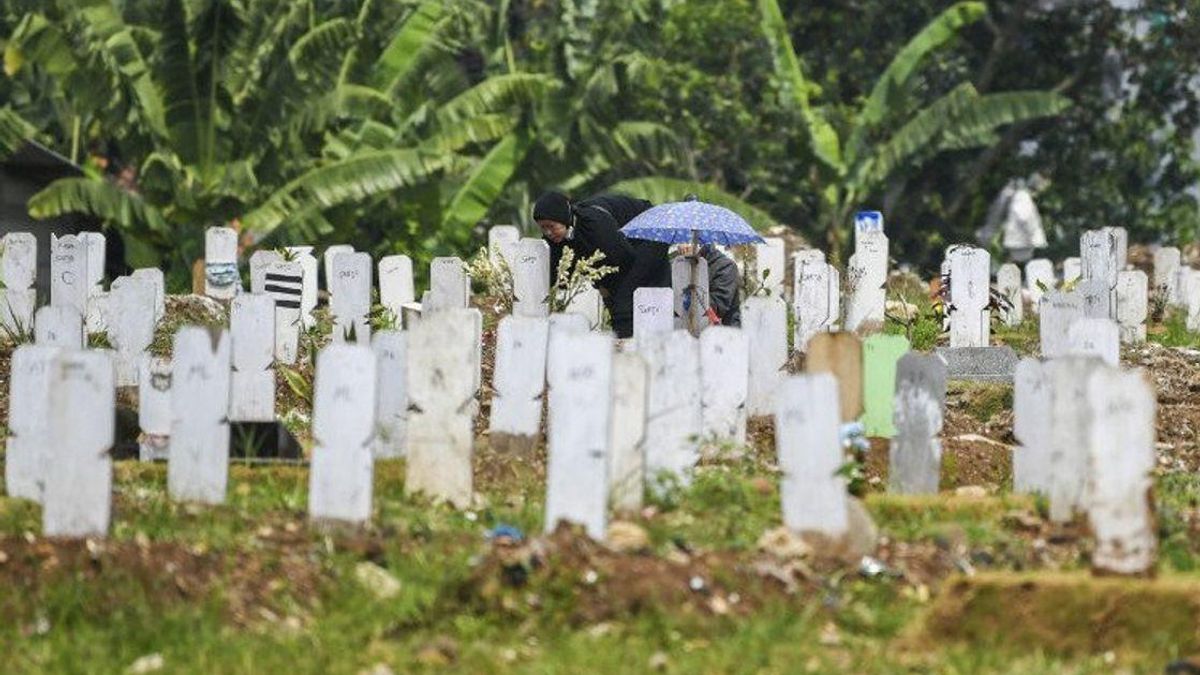
JAKARTA - The number of COVID-19 cases in Indonesia has touched two million. Today, data from the Ministry of Health (Kemenkes) recorded detailed figures of 2,033,421, with 160,524 active cases. It's a blast though it shouldn't be a surprise. How close are we to the worst?
On Wednesday afternoon, June 23, the Ministry of Health announced 15,308 new positive cases of COVID-19. This figure was obtained from the examination of 141,187 specimens. The Ministry of Health also recorded 303 deaths, bringing the total death toll from COVID-19 to 55,594.
Like the previous days, DKI Jakarta remains the province with the most daily cases. Today, 4,693 were recorded, bringing the total cases in Jakarta to 486,957. After Jakarta, there is West Java with 2,910 new cases, Central Java (2,595) and Central Java (873).
The most worrying thing about the explosion of cases is the collapse of the capacity of health facilities. It's already happened. The bed capacity in 106 DKI Jakarta COVID-19 referral hospitals has reached 90 percent. Meanwhile, ICU capacity has reached 81 percent.

"Beds are up to 90 percent ... ICU is 81 percent, we continue to add TT (beds). And ICU rooms," said Deputy Governor Ahmad Riza Patria at DKI Jakarta City Hall, Tuesday, June 22.
If drawn more broadly throughout Java, this emergency also appears evenly distributed. Spokesman for the COVID-19 Task Force, Wiku Adisasmito, explained that the bed occupancy rate (BOR) in all provinces of Java Island had reached 80 percent, except for East Java, which was 66.67 percent.
Detailing the data, West Java's BOR touched 86.36 percent; Central Java 86.16%; DIY 83.39%; Banten 82.77%. Then how severe is the explosion of this case? Referring to the same data, nationally, Indonesia has experienced an increase in weekly cases of up to 92 percent since the last four weeks.
"This is a very sharp increase, and it cannot be tolerated," said Wiku, Tuesday, June 22.
Explosions shouldn't be a surprise
Right, this is a blast. But it shouldn't be a surprise. The shock reactions we see today, especially from the government's side, are nothing more than evidence that the handling of the pandemic in this country is being carried out with a reactive approach. Unscheduled in a grand design that is bright and measured.
Case growth is always predictable. Although it is impossible to be one hundred percent accurate, there is always a model that can be used as a reference to determine pandemic control strategies. Was it done?
Epidemiologist at Griffith University, Australia, Dicky Budiman, highlighted the pattern of pandemic policies that were not based on science by the Indonesian government. Failure to monitor case growth is evident.
"Scientifically, yes, it can be predicted. Rough estimates, but yes. But it will still help with a relatively close range. It can be the basis for strategies to anticipate. The predictions and worst-case scenarios are to increase the response so it doesn't happen. ," Dicky told VOI, Wednesday, June 23.
Many consider the explosion of cases today as the impact of human movement in the Lebaran season. May be. In another version, the government calls the new variant of COVID-19 Delta the culprit in the explosion of cases. Can be. But there is another, more serious problem.
Today's case explosion could be more widespread as the accumulation of mishandling over a year. "I once predicted at the beginning of the year that in the first six months of 2021 we will experience a very critical period."
"Because the critical first three months are a response to prevention. Because this wave will increase towards the peak. And it is an accumulation of one year. So it can be predicted that the saturation point will be reached in June-July.

We need to go back to April 2020 to dive into Dicky's modeling logic. At that time, the World Health Organization (WHO) determined that Indonesia's COVID-19 pandemic situation had reached the level of community transmission or local transmission. It was the first worst siren in our war against the spread of this virus.
At the community transmission level, the authority -- state, city or state -- ideally establishes a total lockdown. Fiji, Brisbane, to Gaza are in total lockdown when they hit that level. There are consequences, of course. Usually economic.
[FLAVOR JOURNALISM: Knowledge and Conspiracy Theories of COVID-19 at the Head of Village Community]
This doubt is experienced by all authorities in the world. But a pandemic is a war that requires decisive and swift policies. The later it gets, the more widespread the infection, the more difficult it is to control, the more options available for action are exhausted.
In the end, the recovery steps will be more difficult. Not only in terms of health but also from an economic aspect. Yes, seeing the problem of today's pandemic is bringing up old policies. A pandemic is a marathon whose finish is determined by us.
"Then the government's response is getting better, stronger, the peak is reached quickly, it ramps up quickly. That's the good thing. So if there is a country with a long, long wave, it means that the intervention was unsuccessful."
"Indonesia has been at the community transmission level since April 2020 until now. This means that there are many cases of infection and this cluster is not detected so that it continues to grow, this case breeds."
How close is the worst and what can we do?
One foot we're already in the middle of the storm. We are in a silent outbreak position. The days ahead will be even more critical and terrifying as the number of tests increases that have implications for case finding and the entry of people into health facilities. Everyone needs focus.
The government must return the orientation of handling the pandemic to health. There is no other way. Tracing, testing, and treatment (TTT) must be launched. On the community side, awareness that the pandemic is not over must continue to be maintained. Taking care of yourself and your family and close people is an obligation.
And most importantly, stop pointing fingers at each other. We are all victims of government mistakes. As described in the BERNAS article entitled Demo Madura: Don't Believe in COVID or Pandemic Policy Skepticism? directed criticism is important.
The pandemic is too energy-consuming. Please allocate energy to the right point. The government likes it or not, it is the party that has all the instruments and resources to deal with the pandemic. Therefore, keeping the government on the right track through criticism is a form of public contribution.
Returning to the context of the peak of today's pandemic, there is some modeling that shows how close we are to the worst. The first is demographics. Indonesia is dominated by young people. Mobility tends to be higher. Implications for virus transmission.
The second model is to periodically monitor growth. Dicky's monitoring of case growth puts the time between June and July as the worst period. "With that growth rate, for example 5 percent, 10 percent, it will reach a saturation point."
"When the cluster continues to move and eventually reaches the most vulnerable group in the population, the elderly, risk factors, that's where it explodes. So that's what is called the peak. Exploding, there are so many cases. Health facilities are overwhelmed."
It takes a radical step than just Micro PPKM
President Joko Widodo (Jokowi) still chooses PPKM Micro as a policy to control the pandemic situation today. This also refutes the push by many parties for the government to take lockdown measures.
"The government has decided that micro PPKM is still the most appropriate policy to stop the spread of COVID-19 down to the village level or directly to the root of the problem," Jokowi said at a press conference, Wednesday, June 23.
Hermawan Saputra, a member of the expert board of the Indonesian Association of Public Health Experts (IAKMI) believes that the government needs to take more radical steps than PPKM Micro. In addition to unresolved clusters, Indonesia is also burdened with the Delta variant of the corona virus which spreads faster.
Micro PPKM, according to Hermawan, will not solve the problem because the prevention is not comprehensive in one area, but only in small settings, namely RT and RW. There are two options offered by Hermawan: Large-Scale Social Restrictions (PSBB) and regional quarantine.
Hermawan then suggested two radical options that the government could take: large-scale social restrictions (PSBB) on a national scale or imposing a regional quarantine. PSBB can be limited to large islands, such as Java, Sumatra, and Kalimantan.
Meanwhile, regional quarantine will have implications for airport closures, local transportation, and strict supervision of activities within the region. "The current situation is very different."
"If the government delays (taking radical steps), the losses will continue to grow, the economy will not recover, and public health is in limbo," said Hermawan, quoted by DW, Wednesday, June 23.
*Read other information about COVID-19 or read other interesting articles from Diah Ayu Wardani, Ferdinand, Wardhany Tsa Tsia and Yudhistira Mahabharata.
Other BERNASThe English, Chinese, Japanese, Arabic, and French versions are automatically generated by the AI. So there may still be inaccuracies in translating, please always see Indonesian as our main language. (system supported by DigitalSiber.id)








